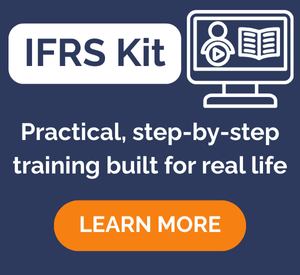How to account for barter transactions?
Should you apply the standard IFRS 15 to the accounting for barter transactions?
Well, it depends.
Today’s question:
“I work in a food producing company and we buy cashew nuts from the local agricultural company for cash. However, recently, our supplier wanted to buy some products from us for their employees and we agreed that they would pay us with cashew nuts.
How shall we account for this transaction under IFRS 15?
It says that non-monetary exchanges between entities in the same line of business to facilitate sales to customers or potential customers are excluded from IFRS 15 rules.
So how shall we account for this transaction?
IFRS Answer: At fair value
Nice question as I love cashew nuts!
My short answer is – under IFRS 15, at fair value.
Let’s break it down.
Does IFRS 15 apply for barter transactions?
It is true that the standard IFRS 15 specifically excludes non-monetary exchanges between entities in the same line of business to facilitate sales to customer or potential customers.
And, the standard gives an example for two oil companies that agree to an exchange of oil to fulfil the demand from their customers in different locations.
The reason why IFRS 15 excludes similar transactions from its scope is that recognizing revenues in this case would just gross up expenses and revenues which is not appropriate when the same company acts as a supplier and a customer of the same homogeneous product at the same time.
So, the first question is:
Q1: Are you working in the same line of business?
I would say no, because the food producer produces the ready-made products and sells them to the end customers.
As opposed to that, the supplier grows cashews and they are pretty different item than processed food and maybe this agricultural company has also different customers.
The second question is:
Q2: Do you swap inventories to facilitate sales to the customers?
As these 2 companies grow or make products for different types of customers, then I would say no, these inventories – cashews for finished products – are NOT made to facilitate sales.
So this is NOT the transaction excluded from the scope of IFRS 15.
How to account for this transaction?
Well, both companies simply recognize the revenue from sale of the products.
The food producer sells the finished products and receives payment with cashews and on the other side the agricultural company sells cashews and receives payment with finished products.
In what amount?
The standard IFRS 15 specifies the rules for non-cash consideration in paragraph 66 that prescribes to measure the revenue at fair value.
In the above question the fair values can be determined quite easily because they will be just selling prices for cash.
Illustration: Barter transactions under IFRS 15
Let’s say that the food producer swapped the cashews with normal purchasing price of 1 000 CU for own finished products with normal sales price of 1 000 CU.
The cost of swapped finished products was 800 CU.
So, the food producer accounts for the sale of finished products as:
-
Debit Inventories of cashews: CU 1 000,
-
Credit Sales of finished goods: CU 1 000.
Then, the finished goods are derecognized from inventories as:
-
Debit Cost of sales: CU 800,
-
Credit Inventories: CU 800.
Simple as that.
IFRS 15 and exchanges of PPE
Let me just add a note to all of this.
IFRS 15 applies to the contracts with customers.
It implies that here we are talking about swapping inventories.
Sometimes, you can swap also an item of property, plant and equipment for some other item of PPE.
In this case, IFRS 15 does not apply, because an item of PPE is not sold or disposed of within your regular operating activity and you can hardly say that the buyer of your PPE is your customer.
Just look who the customer is according to IFRS 15:
“A party that has contracted with an entity to obtain goods or services that are an output of the entity’s ordinary activities in exchange for consideration. “ (IFRS 15 Definitions)
As a result, when you swap an item of PPE, it does not fall under IFRS 15.
Instead, you should be looking at IAS 16 Property, plant and equipment, more specifically at exchanges of assets.
So here, you recognize the asset acquired at fair value, you derecognize the asset given up and you can recognize gain or loss on disposal.
Here’s the video summing up the issue:
If you have any questions, please let me know in the comments below. Thank you!
Tags In
JOIN OUR FREE NEWSLETTER AND GET
report "Top 7 IFRS Mistakes" + free IFRS mini-course
Please check your inbox to confirm your subscription.
28 Comments
Leave a Reply Cancel reply
Recent Comments
- Tan Chee Hong on Retention in construction contracts
- Ahumuza on Accounting for discounts under IFRS
- Saheed Kehinde on How to account for intercompany loans under IFRS
- hassan ali on IFRS 15 Explained: Full Guide on 5-step Model for Revenue Recognition + Free Journal Entries Template
- BiG4 on IAS 23 Borrowing Costs Explained (2025) + Free Checklist & Video
Categories
- Accounting Policies and Estimates (14)
- Consolidation and Groups (25)
- Current Assets (21)
- Financial Instruments (56)
- Financial Statements (54)
- Foreign Currency (9)
- IFRS Videos (74)
- Insurance (3)
- Most popular (6)
- Non-current Assets (56)
- Other Topics (15)
- Provisions and Other Liabilities (46)
- Revenue Recognition (27)
- Uncategorized (1)





Hi Silvia
What if only services were exchanged?
For example a one year license for a software product(SaaS) in exchange for some marketing services.
Let’s say fair market value for the software is 1000 and fair market value for marketing is 800.
What would the debits and credits be since the products are intangible and no inventory is touched?
Good Silva, how do we account for a flight ticket issued to a staff of an airline company at zero value who is on official duty outside his/her working station?
Two how do we treat a similar transaction above where the flight is issued to a passenger at a discounted value during promo exercise.
Hi Ephraim,
if this ticket is issued to employee for purely company reasons (and cannot be viewed as an employee benefit), then it is simply a cost of running a business. If you are analytically accounting for cost of each ticket, then it is a cost of running a business (or whatever reason of that travel was).
If this ticket is issued as a promo of a customer, it is a different situation and depends on a wider context of that promo. Was it just given for free, no strings attached? Or did the customer have to earn it by previous purchases of tickets? Accounting for that transaction will depend on these answers.
please i need explanation my company exchange crude for petroleum product. initially my company had to pay for the crude, how do we record the exchange crude oil and product please
Hi Sylvia
I am Sujith, From Sri Lanka
Its is very helpful article. I need further classification, I am working at Rice manufacturing company. From last six month we take the paddy from Paddy marketing board which is government board and then we are milling the paddy and supply the rice to the Lanka Sathosa which is also fully government owned supermarket network. For this transaction we receive milling charges CU. 4.00/- for one paddy Kg and and transport cost according to the mileages. Our out put ratio is 62% averagely. Also The government has imposed control price for per kg rice is CU 96.00/- . Current market rate of per Kg paddy is Rs. 65.62/
Hi Sylvia
My company sells parts to panel beaters for a cash consideration. Additionally, some of the panel beaters are given use of Demo vehicles belonging to the company – this is done for relationship purposes and to encourage future sales. From a IFRS15 perspective, how would the company have to consider in terms of IFRS15 in relation to the vehicles provided to the customers
Hello Silvia, Be a good day. I am from Myanmar and I work as an accountant in Internet service providing company. Could you please give advice for my question. Firstly, I would like to explain the transaction nature. When the company purchased internet equipment, they recognized as Inventory. They used and installed those equipment for providing internet service. At that time, they capitalized as Internet service provider assets (ISP assets) and credited from inventory. In the subsequent years, one of customers (Telecom company) made a contract to purchase those internet service provider assets from the company. i would like to clarify:
1) Is this should be applied IAS 16? (De-recognized assets and calculate gain/loss on disposal?)
2)As it was recognized as Inventory before capitalized as ISP assets, Can we re-class from Assets to Inventory first when sell to customer and Can we use IFRS 15 to recognize Revenue?
Hi Silvia.
I hope you are safe and doing well in this tough time. First of all, accept my sincere gratitude for your help and support to professionals at large. The way you demonstrate the IFRS concepts, it really helpful in understanding even complex topics in an easy manner.
I have a doubt about the discussed topic. My company is engaged in trading of agricultural products and sometimes it sells the same product to its suppliers which it buys from them. No further processing is carried out by the company on the purchased goods. However, the price at which they transact with each other is different (eg. it buys rice at Rs.100 and sells it at rate Rs.102) and the account settled by netting the account apart from some banking transactions. Do we include this type of transaction in the sale and purchase?
Hi Kanika, I recommend answering the same questions as mentioned above in this article. The primary question is why your company is trading with agri products this way – is it to facilitate sales? Or to make profit?
Thank you for your prompt guidance.
It seems the company serves both of these purposes through this kind of transaction. Since the company is selling at a higher rate than the purchasing price. It is making a profit and also increasing sales. But will it have an impact on the accounting treatment if the company has either of the purposes as suggested by you?
Also, the company is doing this transaction on the same day. Purchasing at lower prices and selling at a higher price. There is no contract exists between the parties since they are sister concerns. Though the company has all the required documents such as bills, transport receipts, etc. but how to establish the genuineness of this transaction?
Hi Silva
for 2 company enter into barter trade and both from different industry. how should this be accounted for under IFRS15 ? refer scenario below:
1/1/2020
Company XYZ Sell/deliver buffet (food) to ABC Advertising Company worth $10k
Dr Customer (ABC Advertising Company) $10k
Cr Revenue $10k
1/5/2020
ABC Advertising Company in return barter trade an advertising space worth $10k to XYZ Company , utlitised advertising space on 1/5/2020
Dr Advertising Exp $10k
Cr Supplier (ABC Advertising Company) $10k
Can both transaction recognise at point of time (inception date) or revenue should defer to May 2020?
Hi Lim,
well, you need to keep up with the rules of IFRS 15 and 1) recognize revenue at the point of time when the food is delivered 2) recognize an expense when the service was provided. So not necessarily in one point of time. S.
Hi
Can you please answer my question, their is a telecom company which give their sites to other telecom partner as co-location agreement,
on my case a telecom company (A) give site to other telecom partner (B) but on consideration the other telecom (B) give sites to (A) telecom company as per co-location agreement the (A) company does not record any revenue and cost relevant to this co-location agreement of site exchanged, can you provide the detail of this question references to IFRS 15.
Hi Silvia,
My company is swapping a real estate residential units with fair value 100 million for other residential units in different city has a fair value of 400 million.
How my company should recognize this transaction? Is it a revenue? And if so, at which amount?
Hi Silvia
the supplier sends us a credit note because of defective items. without taking items. can we consider the amount as other revenue? knowing we can sell this defective item.
warm regards
My company allows various newspapers to run their advertisement on our channels as per our tariff rates , and in exchange these newspapers print our ads of programs in their dailies as per their rates , at the year end a difference is occurs with two different situations ,1 ) either due to excess ads published by us and short advertisement run by them or 2 ) short ads published and excess commercials run . How this difference will be adjusted in our books when barter accounts are closed annually and no balance is carried forward .
Hi Silvia
What if the correct accounting treatment for the situation where third party ask us to relocate the Transmission Tower and they bear the cost for new Tower? We get the new tower at no cost and need to given up ( dismantled and derecognize) old tower. Is it falls under IAS 16 ( swapping or exchange of asset) or under IFRS 15?
Sara, in this case you need to look at your contract for the broader context. If this is a part of some consideration within the service contract (revenue generating), that might go under IFRS 15. I cannot really say from the isolated information.
Hi Silva,
My company has a marketing arrangement with a marketer to help sell Product X on our behalf, this marketer is also a supplier to my company, he supplies product Y which is refined to get product X. On a quarterly basis, we seat down to knock out how much I’m owing him for the purchase of Product Y and how much he is owing me from the sales of Product X. we net-off this amount and who ever is owing will pay a cash balance. Can you please help me out, I’m confused as how to account for this
Hi Silvia,
Thanks for your article, it helped. Given IFRS 15 states that “non-monetary exchanges between entities in the same line of business to facilitate sales to customers or potential customers. For example, IFRS 15
does not apply to a contract between two oil companies that agree to an exchange of oil to fulfil demand from their customers in different specified locations on a timely basis.” how would you account for a barter transaction of similar services? I understand there will be an inventory impact for similar goods but what about services? Which standards should be followed as IAS 18 has been superseded by IFRS 15 (and those transactions are out of scope)?
Thank you.
Kind regards,
Xavier
Hi,
Here we have to look two aspects for barter tranastion
1) whether similar goods are exchanged
– if similar goods /service are exchanged , it is not a transaction because there is no revenue generated. Eg An oil company ‘A’ operates through out the country , due to operational convenient it plans to buy oil from company ‘B’ at one location and provide the same quantity of oil to Company B at different location . Here, Exchanged goods are similar and does’t generate revenue. So its not comes under revenue .
2)whether dissimilar goods are exchanged
if exchange of dissimilar goods ,fair value of goods received to be arrived . In case of non availability of fair value in the market for received goods, value of given goods to be considered as fair value
In this scenario , your company is exchanging dissimilar goods ,ie cashew and your company’s product.You have to get fair value of cashew nuts and book as revenue .
Hi, I think that you are talking about IAS 18 rules that are obsolete – no longer valid. The purpose of this short article was to give guidance on how to account for barter under the new IFRS 15 rules. S.
Hi Silvia
What if only services were exchanged?
For example a one year license for a software product(SaaS) in exchange for some marketing services.
Let’s say fair market value for the software is 1000 and fair market value for marketing is 800.
What would the debits and credits be since the products are intangible and no inventory is touched?
thanks
Fredrik
Silvia, hello
Can you please advise. The service company sends us some spare parts, which are to be installed to our equipment, the dismantled parts are sent back. So, there is continous exchange of the same goods. The received goods are considered being our goods (risks and control over goods are transferred to us), however there is obligation to return the dismantled similar parts. My understanding that we should recognise the received spare parts under IFRS 16 (since the similar dismantled parts included in PPE) at the fair value (current market value, not considering costs of transportation etc), with the relative recognition of liability. While, the dismantled parts when removed and returned back should be accounted at the balance net value with the difference recognised to PL. Since the balance value of each parts are not available, we make the best estimate that is approximately is the value of the goods recieved minus repair services fees. Please correct me, if you see there is wrong logic.
Hi Silvia,
Do you mean to say that in barter transactions it is necessary to set fair value of both the products as same?
Well, it is assumed that the transaction happens at fair value, otherwise it would not be at commercial terms. S.
Hi Silvia, I’m looking for a bit of clarification here. How would one inward something to a raw material inventory without a proper purchase order and how does one equate the fair value. Are we saying that the food processor will have to enter into an agreement with the cashew supplier to supply processed food at his/her selling price in exchange for an equivalent value worth of cashews. Don’t you think this will lead to a purchase price variance if the standard cost of cashew is already updated in the system of the food processor as the food processor regularly purchases cashew from the supplier. Please let me know.
Hi Venkat,
as for purchase orders – this must be solved internally, IFRS do not solve the internal accounting processes – they just guide us on recognizing the transactions. I can imagine that when the barter is agreed, then some sort of purchase order can be created in the system.
Again, as for fair values – of course, they would both have to agree the prices, quantities, etc. – and no, the variance might not necessarily be created if the quantities/prices are agreed at fair values.